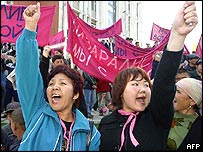Kyrgyzstan's Semi-Violent Pink and Yellow Revolution

Pink and Yellow Revolution

Update 26 March: Nope, the US doesn't like it.
Update: Statement below incorrect. US Ambassador to Bishkek Stephen Young says US played a role in in the "Tulip" revolution.
Update: W and Rummy don't seem to like it! They've called the Russians asking what they can do to restore order.
Has color-coded revolution leapfrogged from Beirut to Bishkek? One thing is for certain, the monitoring apparatus of OCSE is on-site (and rather far afield). OCSE backs up the Opposition’s claim of intimidation and ballot fraud in which it only “won” only 6 out of 75 seats in Parliament in the 13 March elections.
Shouting their slogan, Kel-kel (Out!), the people of Kyrgyzstan, not as photogenic or well dressed as the handsome youth of Beirut, have taken to the streets, sweeping up from the south and into the capital, Bishkik, putting President to flight and forcing the resignation of his Defense and National Security ministers. The pan-national alliance of veteran Communists, Islamic notables, tribal chieftains, young Muslim militants, and gangs of unemployed youth supported by dissident government figures, behind the revolution has won a ruling from the Supreme Court, nullifying the fraudulant elections.
President Askar Akayev, a liberal reformer at the outset, made Kyrgyzstan his personal fief. A secular physicist in this Sunni Muslim country, Akayev imported free-market ideology only to pounce on the country’s main economic sectors of gold mining, alcohol and tobacco sale and telecommunications to bring them under his family’s control. Establishing himself and his kin as oligarchs, he then engineered a change in the country’s constitution, throwing out term limits. During his career as Oligarch-in-Chief, Akayev invested nothing into the country, ballooned its foreign debt, provoked a severe housing and employment crisis, imprisoned vocal opposition leader Felits Kulov on a trumped up charge of embezzlement and inevitably cheated to stay in power.
[Note: Putin would not let Akayev's plane land in Russian territory--he must not have appreciated that base lease to the Americans.]
Following the 13 March elections, the Opposition found itself with just 6 seats in the national legislature. In the south and west of the country, where the opposition was strongest, Akeyev’s picks (and virtual unknowns) won in the districts where they ran. Demonstrations, spearheaded by opposition leaders Kurmanbek Bakiev and Rosa Otunbayeva, began in Osh and Jalalabad then transformed into a march on the capital, Bishkek. The moment of truth came for Akayev and his family after Minister of State Osmanakhan Ibraimov resigned in protest of Akeyev’s planned use of force resulting in police and army going over to the Opposition.
Let's take a look at the recipe for spontaneous revolution which we discussed in February to see if all the ingredients were present in Kyrgyzstan:
1. A semi-dictatorship or a country too reliant on the good graces of the West to shoot the demonstrators. Check. Akayev's government was a liberal kleptocracy. There is a US airbase in the country (this may be irrelevant, though) and the government was reliant on Western loans to stay afloat.
2. An election in which the government is forced to commit fraud to stay in power. Check. Fraud on a massive scale.
3. Cooperation with local media to ensure that the fraud is substantiated and reported. Check. Russian radio Moscow Echo and news agency Itar-Tass, both of which are followed in the country, played a major role in reporting the fraud. Futhermore, the Opposition rallyed all its forces in Osh following the election where it set up a provisional assembly, or kouroultaï, which could not escape national media attention.
4. An opposition figurehead who steps out of the targeted government as a reformer. Check. In this case more than one: Ex-Premier Ex-premier Kurmanbek Bakiyev, ex-Foreign Minister Rosa Otunbayeva and others.
5. A sincere desire for change on the part of the population which cannot be challenged. Check. The people were plunged into poverty and exploited by the Akayev family's strangehold on government and business.
***Ramifications*** Kyrgyzstan may indeed the the test case for Egypt, where the opposition is preparing to contest the Mubarek dynasty's 20-year grasp on power in upcoming elections. One extraordinary aspect of the revolution in Kyrgyzstan is the alliance of Islamic clerics and militant Muslim youth with Communists to bring down a family cabal and a sham democracy. All it takes is election fraud...and we may see Egypt's [color choice pending] revolution.


0 Comments:
Post a Comment
<< Home